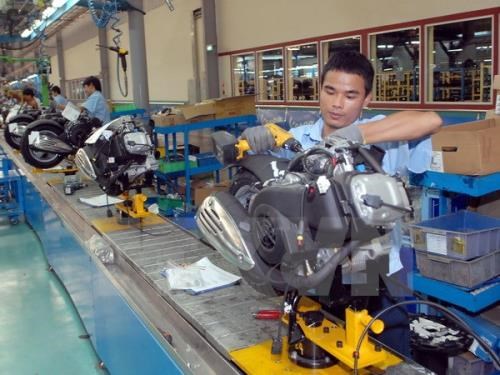Industrial revolution poses challenges to APEC economies
 Illustrative image (Source: VNA)
Illustrative image (Source: VNA)Deputy Minister of Labour, Invalids and Social Affairs Doan Mau Diep delivered this message at the “Workshop on the World of Work and Labour Market Information in the Digital Age” which was held in Hanoi on May 11 in preparation for the High Level Policy Dialogue on Human Resources Development in the Digital Age.
The workshop takes place at a time when the world of work is experiencing great structural changes due to technological advances, specialised production and growing demand for highly skilled workers and changing labour relations.
Technology and digitalisation are expected to make important contributions to improving productivity, expanding economic growth and generating jobs. But, technology and digitalisation are also creating risks related to employment.
A study conducted by the International Labour Organisation (ILO) showed that new technologies will be applied thoroughly in labour-intensive industries, resulting in big cuts in low-skilled labour workforce.
The APEC member economies are facing challenges in satisfying the manpower demand for the digital economy. These are also challenges that the economies are coping with in implementing structural reforms to support investment in human resources development and market restoration.
For Vietnam, Diep said the government already set out the tasks of renovating the growth model, restructuring the economy and taking full advantage of scientific and technological advances, towards improving quality of economic growth and bolstering rapid, sustainable development.
He stressed that Vietnam is lacking highly-skilled technicians and workers, especially in the key industries of mechanical engineering, electronics, and electric techniques as well as in sectors that have strong impacts on high and sustainable growth amid international integration.
The shortage of highly-skilled workers has worsened due to shortcomings in labour demand-supply connection, Diep said, adding that improving the labour market information system and reducing time for labour demand-supply connection is seen as an urgent and feasible task in the age of information technology.
The Human Resources Development Working Group (HRDWG) is sparing no effort to build a draft document on human resources development in the digital age. This initiative is aimed at enhancing regional cooperation in personnel training to cope with challenges in the digital age, focusing on labour market development, education and vocational training, and social security, Diep said.
Experience, vocational training models and policies on the labour market and social security shared at the workshop will help the APEC economies draw lessons and boost cooperation in the process of sustainable development.-VNA













